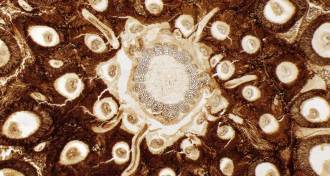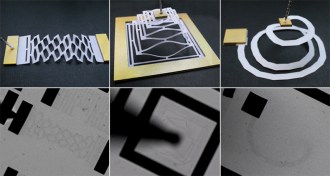News in Brief
-
 Genetics
GeneticsMice lose a gene to drop some weight
Mice lacking gene have less fat, more muscle and lived longer than normal.
-
 Plants
PlantsFossil fern showcases ancient chromosomes
Fossil nuclei and chromosomes seen in a 180-million-year-old fern reveals that the plants have stayed mostly the same.
By Meghan Rosen -
 Climate
ClimateClimate change may spread Lyme disease
The territory of the ticks that transmit Lyme disease is growing as the climate warms.
By Beth Mole -
 Life
LifeVitamin A deficit in the womb hurts immune development
Mice deprived of vitamin A in utero grow up with undersized immune organs.
By Nathan Seppa -
 Genetics
GeneticsEarly Polynesians didn’t go to Americas, chicken DNA hints
Contamination of ancient chicken DNA may explain previous report linking Polynesians to South America.
-
 Genetics
GeneticsGiant moa thrived before people reached New Zealand
Humans probably caused the extinction of giant wingless birds called moa in New Zealand, DNA evidence suggests.
-
 Materials Science
Materials ScienceWorld’s thinnest material stretches, bends, twists
Graphene, the thinnest known material at one carbon atom thick, can be manipulated under the microscope using tricks from a variety of paper-cutting origami called kirigami.
By Andrew Grant -
 Astronomy
AstronomyMature galaxies found in young universe
Inactive galaxies the size of the Milky Way found dating to when the universe was just 1.5 billion years old.
-
 Chemistry
ChemistryMilk protein a potential flame retardant
Protein found in milk offers a nontoxic way to extinguish fabric fires.
By Beth Mole -
 Neuroscience
NeurosciencePianists learn better by playing
Pianists’ muscle memory helped them recognize incorrect notes.
-
 Animals
AnimalsChimps catch people’s yawns in sign of flexible empathy
Chimpanzees may show humanlike empathy, as evidenced by their contagious yawning.
By Bruce Bower -
 Health & Medicine
Health & MedicineMS milder when patients begin with higher vitamin D levels
Multiple sclerosis patients with low concentrations of vitamin D early in their disease have more nerve damage several years later.
By Nathan Seppa